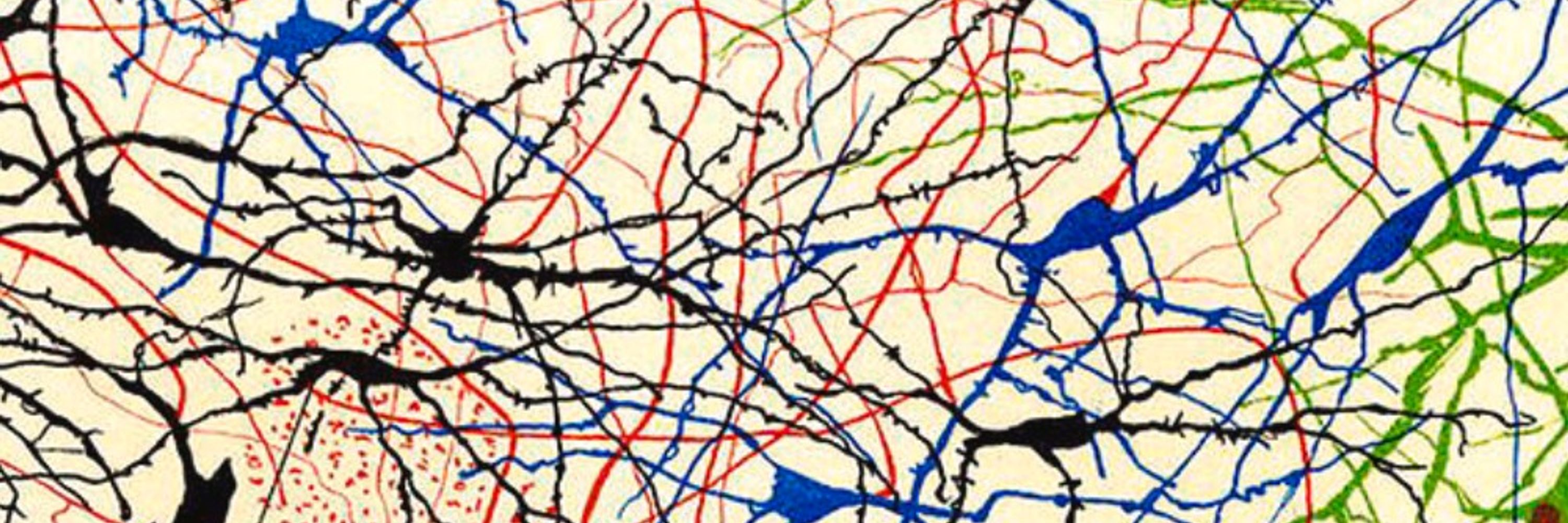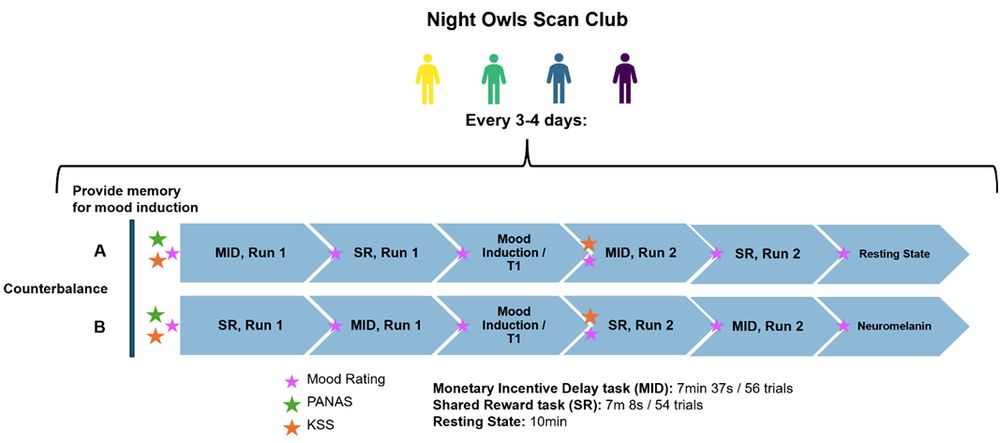
Matt Mattoni
@mattmattoni.bsky.social
Temple Clinical Psychology PhD Student 🦉 | Heterogeneity in Brain Networks & Psychopathology | First Gen | NRSA F31 Fellow
Reposted by Matt Mattoni
🧵8
We focused on fMRI studies of 🧠 networks… but there’s so much more neat idiographic work being done in other neuroimaging & psychology domains! See @mattmattoni.bsky.social's recent review for more thoughts on uniting these perspectives
www.sciencedirect.com/science/arti...
We focused on fMRI studies of 🧠 networks… but there’s so much more neat idiographic work being done in other neuroimaging & psychology domains! See @mattmattoni.bsky.social's recent review for more thoughts on uniting these perspectives
www.sciencedirect.com/science/arti...

Group-to-individual generalizability and individual-level inferences in cognitive neuroscience
Much of cognitive neuroscience research is focused on group-averages and interindividual brain-behavior associations. However, many theories core to t…
www.sciencedirect.com
October 16, 2025 at 3:00 PM
🧵8
We focused on fMRI studies of 🧠 networks… but there’s so much more neat idiographic work being done in other neuroimaging & psychology domains! See @mattmattoni.bsky.social's recent review for more thoughts on uniting these perspectives
www.sciencedirect.com/science/arti...
We focused on fMRI studies of 🧠 networks… but there’s so much more neat idiographic work being done in other neuroimaging & psychology domains! See @mattmattoni.bsky.social's recent review for more thoughts on uniting these perspectives
www.sciencedirect.com/science/arti...
Big thanks to the team, particularly David’s lab to get this study done with a highly reproducible and open workflow! We hope the dataset is of interest to others and are very excited to see where precision imaging goes next! Data can be found on OpenNeuro: openneuro.org/datasets/ds0...
OpenNeuro
openneuro.org
September 29, 2025 at 4:42 PM
Big thanks to the team, particularly David’s lab to get this study done with a highly reproducible and open workflow! We hope the dataset is of interest to others and are very excited to see where precision imaging goes next! Data can be found on OpenNeuro: openneuro.org/datasets/ds0...
This work was inspired by an awesome similar study by @johnflournoy.science 2024 (pubmed.ncbi.nlm.nih.gov/38141745/), obviously the midnight scan club @gordonneuro.bsky.social 2017 (pmc.ncbi.nlm.nih.gov/articles/PMC...) and many other amazing recent studies in precision imaging

A precision neuroscience approach to estimating reliability of neural responses during emotion processing: Implications for task-fMRI - PubMed
Recent work demonstrating low test-retest reliability of neural activation during fMRI tasks raises questions about the utility of task-based fMRI for the study of individual variation in brain functi...
pubmed.ncbi.nlm.nih.gov
September 29, 2025 at 4:41 PM
This work was inspired by an awesome similar study by @johnflournoy.science 2024 (pubmed.ncbi.nlm.nih.gov/38141745/), obviously the midnight scan club @gordonneuro.bsky.social 2017 (pmc.ncbi.nlm.nih.gov/articles/PMC...) and many other amazing recent studies in precision imaging
Overall, results point toward the reward response being more appropriate for within-person rather than between-person study. This is a notable shift from typical focuses, but we’re excited in that we believe there’s a lot of potential for WP level of analysis

September 29, 2025 at 4:39 PM
Overall, results point toward the reward response being more appropriate for within-person rather than between-person study. This is a notable shift from typical focuses, but we’re excited in that we believe there’s a lot of potential for WP level of analysis
Side note (for this thread), the manuscript also gets into some interesting precision imaging methodological points. Highlights are the benefits of multivariate signatures and higher number of trials for tasks.
September 29, 2025 at 4:39 PM
Side note (for this thread), the manuscript also gets into some interesting precision imaging methodological points. Highlights are the benefits of multivariate signatures and higher number of trials for tasks.
More broadly, 10-30% of intraindividual variance in the reward response were explained by fluctuations in mood and alertness.
September 29, 2025 at 4:39 PM
More broadly, 10-30% of intraindividual variance in the reward response were explained by fluctuations in mood and alertness.
In our small sample, there isn’t a clean significant effect, but there does seem to be some potential that anticipatory reward responses (but not consummation) increased following the mood induction

September 29, 2025 at 4:38 PM
In our small sample, there isn’t a clean significant effect, but there does seem to be some potential that anticipatory reward responses (but not consummation) increased following the mood induction
Our mood induction paradigm (positive memory reflection) showed small but consistent increases in mood. This is notable particularly in contrast to general decreases in mood and alertness across time (especially in a scanner).

September 29, 2025 at 4:38 PM
Our mood induction paradigm (positive memory reflection) showed small but consistent increases in mood. This is notable particularly in contrast to general decreases in mood and alertness across time (especially in a scanner).
[insert rant about between-person and within-person relationships being different, WP relationships being important but understudied]. Or, see review here: doi.org/10.1016/j.ne...
Redirecting
doi.org
September 29, 2025 at 4:37 PM
[insert rant about between-person and within-person relationships being different, WP relationships being important but understudied]. Or, see review here: doi.org/10.1016/j.ne...
So, there is converging evidence from many studies that reward responses, like most task based activations, are not fit for trait-like markers or between-person study. All hope isn’t lost, though, what if the reward response instead reflect state-like, within-person variance?

September 29, 2025 at 4:37 PM
So, there is converging evidence from many studies that reward responses, like most task based activations, are not fit for trait-like markers or between-person study. All hope isn’t lost, though, what if the reward response instead reflect state-like, within-person variance?
We also used single-trial models to examine internal consistency. With how noisy single trials can be, we were surprised that the split-half reliability wasn’t too bad. It doesn’t seem like low test-retest reliability is just a matter of noise.

September 29, 2025 at 4:36 PM
We also used single-trial models to examine internal consistency. With how noisy single trials can be, we were surprised that the split-half reliability wasn’t too bad. It doesn’t seem like low test-retest reliability is just a matter of noise.
As others have found, test-retest reliability was very low. We show this reliability is not improved with precision imaging data with short retest intervals.

September 29, 2025 at 4:36 PM
As others have found, test-retest reliability was very low. We show this reliability is not improved with precision imaging data with short retest intervals.
4 participants were scanned ~12 times each. Each session included 4 reward tasks, a positive mood induction, and resting state or neuromelanin (NM not yet available). With our focus on intraindividual changes in the reward response, we included a positive mood induction and tracked mood across time.

September 29, 2025 at 4:35 PM
4 participants were scanned ~12 times each. Each session included 4 reward tasks, a positive mood induction, and resting state or neuromelanin (NM not yet available). With our focus on intraindividual changes in the reward response, we included a positive mood induction and tracked mood across time.
Awesome paper (and code release)! Great to see the data match the intuition.
September 19, 2025 at 7:06 PM
Awesome paper (and code release)! Great to see the data match the intuition.
In terms of what I think is actually going on with a client in front of me, I don't think categories get us there. I much more view things through a behavioral lens of we learn things that can later be adaptive or not; and folks have underlying personality/biology thatlead to different learning
September 15, 2025 at 8:21 PM
In terms of what I think is actually going on with a client in front of me, I don't think categories get us there. I much more view things through a behavioral lens of we learn things that can later be adaptive or not; and folks have underlying personality/biology thatlead to different learning
Right, which I don't see as very useful.
A takeaway I had from this is we could explain most of the variance with restricting to principal symptoms (e.g., uncontrollable worry). I think that makes sense to the extent we need diagnoses for our medical model-ization of psychology (e.g., billing)
A takeaway I had from this is we could explain most of the variance with restricting to principal symptoms (e.g., uncontrollable worry). I think that makes sense to the extent we need diagnoses for our medical model-ization of psychology (e.g., billing)
September 15, 2025 at 8:17 PM
Right, which I don't see as very useful.
A takeaway I had from this is we could explain most of the variance with restricting to principal symptoms (e.g., uncontrollable worry). I think that makes sense to the extent we need diagnoses for our medical model-ization of psychology (e.g., billing)
A takeaway I had from this is we could explain most of the variance with restricting to principal symptoms (e.g., uncontrollable worry). I think that makes sense to the extent we need diagnoses for our medical model-ization of psychology (e.g., billing)
Finally got to reading this - really interesting work! I'm not fully there with the defense of categories, but this was quite compelling. I appreciate that the sets seem to overlap / how we (I?) tend to practically think in the clinic. What's the focal problem? Not a list of each possible symptom
September 15, 2025 at 6:01 PM
Finally got to reading this - really interesting work! I'm not fully there with the defense of categories, but this was quite compelling. I appreciate that the sets seem to overlap / how we (I?) tend to practically think in the clinic. What's the focal problem? Not a list of each possible symptom

